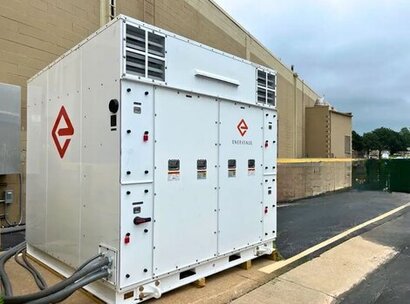
RWE is conducting the pilot project at its Milwaukee-area US testing facility, where the company is now cycling EnerVenue's ESVs to examine the batteries' performance characteristics. The goals of this pilot project include validating ESV cycling flexibility, charge/discharge characteristics, duration, temperature performance, and efficiency validation. RWE will use the data collected to align EnerVenue's technology for potential future RWE applications.
ESVs offer the prospect of ultra-long lifespans and efficient, flexible deployments via their highly configurable and scalable product architecture. The batteries are designed to exceed a 30,000-cycle life and cycle up to three times per day without rest. They offer improved safety without the thermal runaway or propagation risk exhibited by incumbent lithium-ion technologies - eliminating the need for expensive, auxiliary fire suppression solutions. ESVs are also more readily recyclable than lithium-ion, making the batteries especially sustainable and environmentally responsible.
“Grid-scale energy storage that promises to be safer, flexible, and more durable offers great potential for meeting our continuously growing demand for energy” said Andrea Hu-Bianco, SVP of Engineering, RWE Clean Energy. “Meeting clean energy goals will necessitate several capable and scalable solutions, and we look forward to assessing the performance of EnerVenue's metal-hydrogen technology as part of our pilot program at our testing facility in Milwaukee, led by Guy Moore, Director of BESS System Integration , that acts as our innovation incubator to test Lithium and beyond-Lithium battery technology, power conversion system and controls.”
RWE is contributing significantly to the success of the energy transition and the decarbonization of the energy system with its investment and growth strategy Growing Green. The company develops, builds and operates battery storage systems in the United States, Europe and Australia. It currently operates battery storage systems with an overall capacity of 0.7 GW and approximately 1.4 GW of battery storage projects under construction worldwide. As an integral part of its Growing Green strategy, RWE plans to expand its battery storage capacity to 6 GW worldwide by 2030.
“Energy Storage Vessels are built to meet the demands of even the most diverse and challenging clean energy applications, providing a reliable, long-lasting, and sustainable answer for large-scale renewable energy projects” added Majid Keshavarz, CTO, EnerVenue. “Collaborating with a leader like RWE allows us to showcase the capabilities of our technology and demonstrate how it can drive the future of clean energy expansion and grid resilience.”
For additional information:

